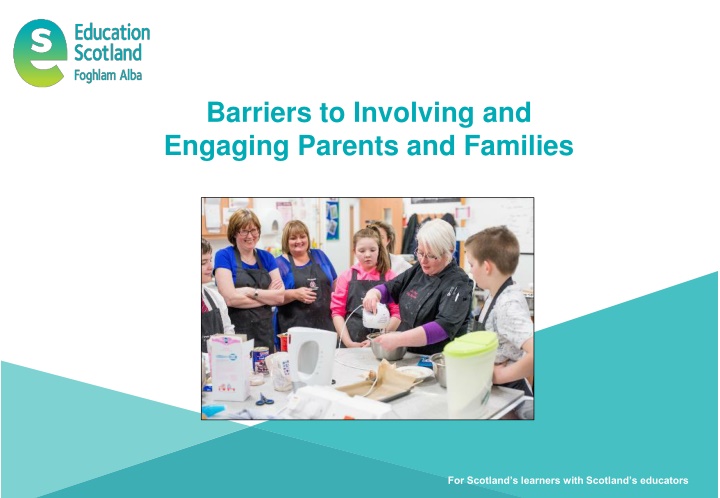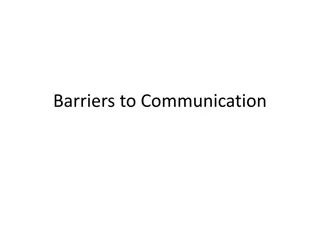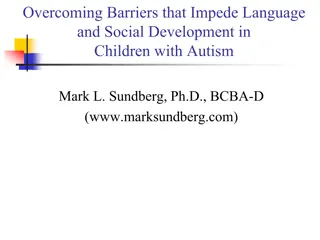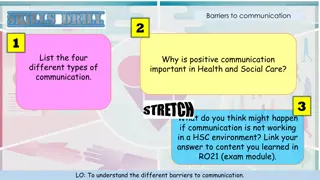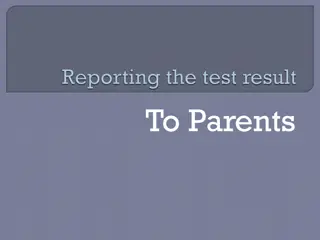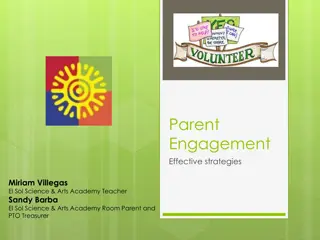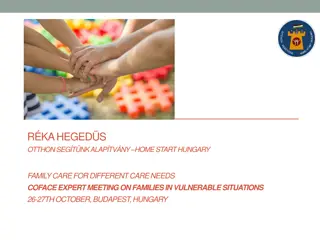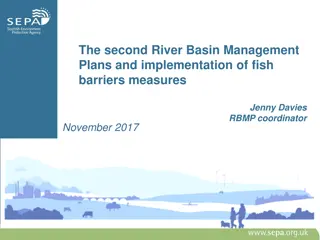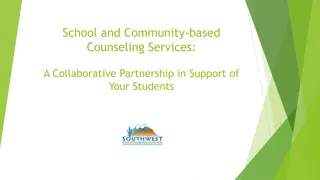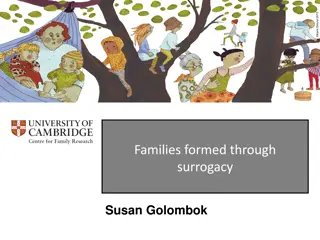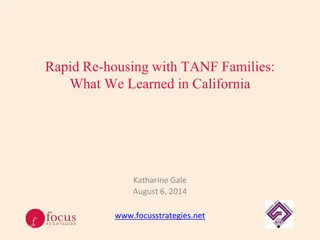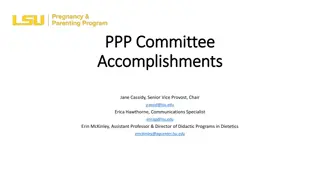Barriers to Involving and Engaging Parents and Families in Education
This content explores the barriers to involving and engaging parents and families in the education of Scotland's learners. It discusses challenges faced by both parents and educators, such as lack of opportunities, digital poverty, mental health issues, and more. Strategies to address these barriers are highlighted, emphasizing the importance of parental involvement in a child's education.
Download Presentation

Please find below an Image/Link to download the presentation.
The content on the website is provided AS IS for your information and personal use only. It may not be sold, licensed, or shared on other websites without obtaining consent from the author.If you encounter any issues during the download, it is possible that the publisher has removed the file from their server.
You are allowed to download the files provided on this website for personal or commercial use, subject to the condition that they are used lawfully. All files are the property of their respective owners.
The content on the website is provided AS IS for your information and personal use only. It may not be sold, licensed, or shared on other websites without obtaining consent from the author.
E N D
Presentation Transcript
Barriers to Involving and Engaging Parents and Families For Scotland s learners with Scotland s educators
Self-Evaluation Exercise Purpose - To consider the diverse parent community in your catchment area through a self-evaluation exercise See Section 3 of the Engaging parents and families: A toolkit for practitioners https://education.gov.scot/resources/engaging-parents-and-families-a-toolkit-for-practitioners/ For Scotland s learners with Scotland s educators
Comparisons - Barriers to involving and engaging parents and families Parents and families No opportunities or not aware Bereavement Digital devices / data poverty Balancing work / learning at home Mental health Anxieties, feeling disconnected from setting/school Own or child's Additional Support Needs Time, cost Other children Confidence Language barriers Literacy / numeracies issues Previous negative experiences Financial stress Household stress Shared parenting Social isolation Age Caring responsibilities Research Educators and practitioners Time Staffing Cover Private space to make calls Making connections Skills, competencies, standards, building blocks are required Little or no professional learning Unaware of the importance of involving/engaging parents Beliefs, unconscious bias Attitudes Personal anxieties over engaging with parents and families Lack of strategies Not equipped to work with parents and families Uninvolved Reluctant to participate Hard to reach Apathetic and indifferent to child's education Do not care about child's education Responsibility placed on parents when no participation Access to capital affects ability to act and participate Despite educational theory on the importance of involving / engaging parents, practice lingers behind Future rests on teacher training and professional learning Parents feel unable to engage with child's learning Setting or school factors For Scotland s learners with Scotland s educators
Barriers to engaging parents timeline (2011-2022) Parents feel unable to engage with children s learning Time, childcare, transport, knowledge, information, awareness, motivation, working patterns, English as additional language, negative experiences, perceptions, gender 2017 2017 Individual parent and family factors 2011 2019 2020-2022 Not allowed in setting/school Less opportunities to build relationships and get involved in wider life of setting / school Feelings of failing children Bereavement Digital poverty Balancing work/learning at home Less opportunities to access support Changing timescales and restrictions Mental health and wellbeing Frustration Anxieties Self-isolation/shielding Communication Transitions Inconsistencies Feelings of being disconnected from setting / school Additional support needs No opportunities Work commitments Parent-teacher factors Caring for younger children Child factors Lack of confidence Socio-economic, poverty, social inclusion, additional support needs, disabilities, parenting skills, shared parenting, mental health issues, substance misuse, offending Societal factors Not aware of opportunities Cost Language barriers Information and support, effective strategies, community and family based interventions COVID-19 Barriers 2020-22 (Centre for Research on Families and Relationships - 2017) Parental Involvement / Engagement census - 2019 (Scottish Executive - 2005 - Updated by Education Scotland in 2017) (Hornby and Lafaele - 2011) For Scotland s learners with Scotland s educators
Local authority PIE Census data Practitioners should insert information on their local authority s PIE Census data. For example, this could include data on the following: Comparative number of responses between surveys e.g. 2019 compared to 2022 Barriers: what is preventing parents from getting involved and engaged e.g. work commitments, no opportunities by age or SIMD by sector e.g. primary, secondary by ethnicity Learning at Home: Data on schools providing parents with information they need to support their child's learning at home. Family Learning: Percentage of schools making parents aware of Family Learning opportunities Percentage of parents that have taken part in Family Learning opportunities
National Parental Involvement and Engagement Census 2022 https://www.gov.scot/publications/parental-involvement-and-engagement-census- scotland-2021-22/pages/parental-involvement-and-engagement/
